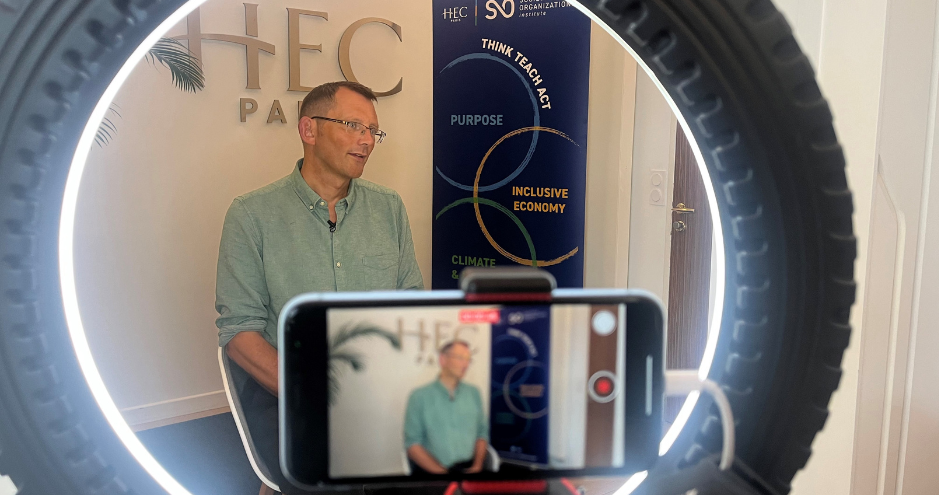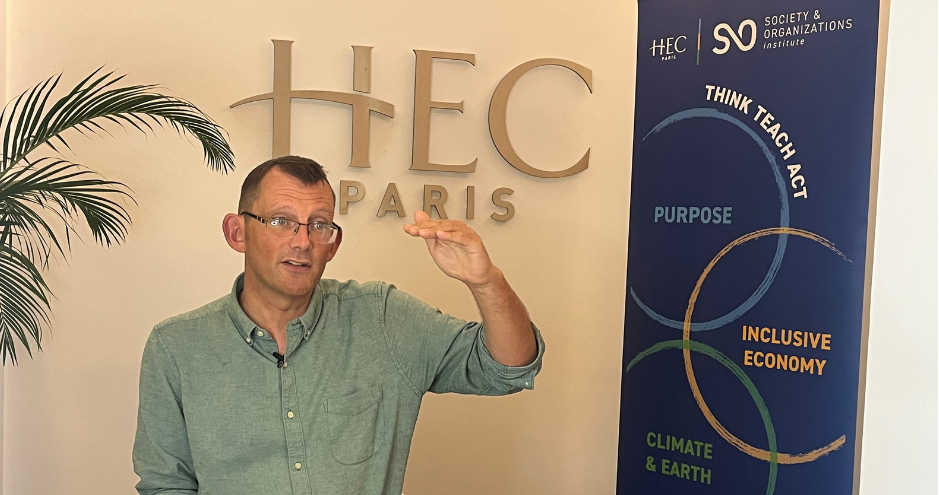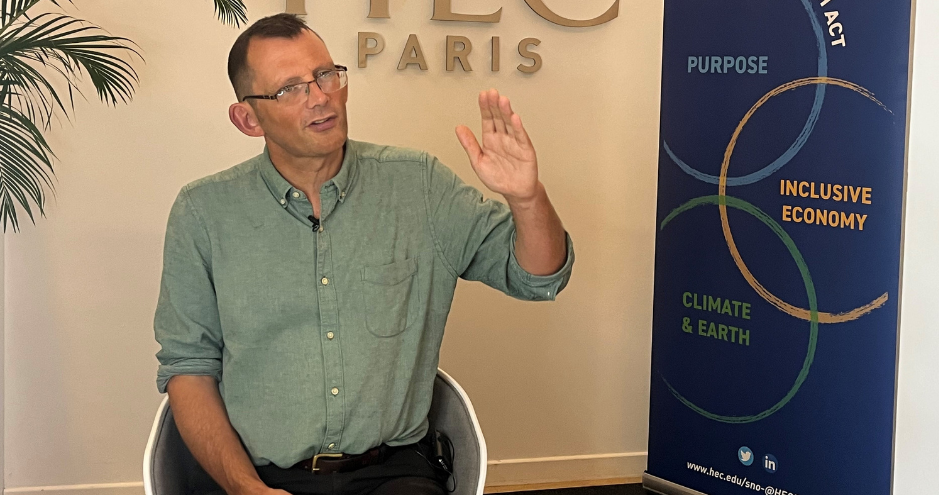An Optimistic Voyage to 2030 with Transition Pioneer Rob Hopkins
Environmental activist and co-founder of the Transition Network, Rob Hopkins returned to HEC Paris this fall to share his vision of the world in 2030, exactly six years after his first visit. The English writer embarked several hundred students and staff members on a voyage of the imagination into the year 2030, when the world finds solutions to the tough climate challenges the globe is facing in 2023. Hopkins’ daylong visit to the HEC campus centered on “longing on a large scale”.

Dr. Rob Hopkins: "Our collective imagination muscle needs to be mobilized."
In 2016, Rob Hopkins brought to HEC a “Cookie Monster” image. This time round, it was his Time Machine, a compact object with a magic light bulb shining inside. Seven long years bridged by one same objective: to transform our appraisal of a bleak planet, ravaged by climate and environmental deregulation, into one where hope conquers all. This vision is encapsulated in Hopkins’ sixth and latest book subtitled “Unleashing the Power of Imagination to Create the Future We Want”. In this work, Hopkins encourages a return to positivity and “true creative thinking”. “My focus over the last four years has been around imagination,” he tells us during a long exchange before his HEC Talks, organized by, and for, the school’s students. The 55-year-old quotes the African American author bell hooks: “What we cannot imagine cannot come into being.” The academic with a doctorate on localization and resilience, elaborates: “We’re living in a time when climate scientists say that we have to fundamentally reimagine good things for our education system, our energy system, our food system, our transport system. Even, if we achieve what the Paris Agreement has set out – and that, in my opinion, is not ambitious enough – we still need to make a 48% cut in our carbon emissions by 2030. In the UK and in France, that's huge. That goes way beyond just the idea that we'd all switch to electric cars and put solar panels on the roofs. It's a fundamental reimagining of things and our collective imagination muscle needs to be mobilized,”
Hopkins certainly has been flexing that muscle ever since he co-founded Transition Networks back in 2005. This is when he became aware that society wasn’t responding fast enough to calls for more sustainability: “We've built a culture which acts like a dissimulation machine, creating worse conditions for the imagination. But we're not going to achieve anything unless we can instigates a deep longing for it, one that wakes us up in the morning. I want to live in a low carbon, more localized, more resilient society. That's my new North star. That's the work of the imagination.”

Conquering the Creativity Crisis
This ‘imagination’ activist who lived over two years in a Tibetan Buddhist monastery in Italy has spent decades reflecting on ways to combine philosophy, environmental quality and resource management (that was the actual name of the first-class Honors degree he received back in 1996). “These past years I’ve moved away from my day-to-day work around the Transition Movement and more into this radical imagination approach,” he tells us. One movement which helped inspire this transition is the advocacy work of African Americans: “They are really talking about radical imagination as being central to their campaigns. You know, all change-making is really about storytelling and coming up with better stories. We simply cannot do the low-carbon transition in the time scale that we have without artists, storytellers, poets, rappers, street artists, screenwriters. We need everybody in this movement because we need to be able to imagine it first.”
Yet, already back in 2010 US magazine Newsweek signaled a creativity and imagination crisis – and Hopkins admits so much. He puts it down to several factors, all acting simultaneously: “It's like a perfect storm. We've created an education system that is really designed to remove our capacity for imagination. Instead, it's all about maths, science, technology and English. And this is at the expense of art, innovation, critical thinking and creative writing. At the same time, we spend less and less time outdoors. Instead, we all carry around these highly addictive devices in our pockets. 20 years ago, we would have gone for a walk and written a poem or had some reflection time. How many great, transformative ideas are just never born because, instead we just check our Instagram feed?”
Hopkins warms to the subject: “We know that cortisol, that hormone released when we are anxious or traumatized, is profoundly damaging to the hypothalamus, the part of our brain where our imagination fires from. People with post-traumatic stress disorder have a hypothalamus that’s 20% smaller than it would otherwise be. And I think in many ways, those in power have created a sort of “cortisol economy” where we have so many people who are precarious, anxious, who don't know where their housing or their food will next come from. In the UK, one in five mothers are going hungry in order to feed their children. Last winter 25% of homes never turned their heating on because they couldn't afford to pay. So, through austerity economics we’ve created the worst possible conditions for the human imagination.”
Hopkins points to recent British policies to defund the arts and reduce access to music as a symptom of this austerity. “All of these things come together. And just add to the mix an economy which is widening the gap between rich and poor. We know that inequality creates the worst possible conditions for the imagination as well. If you ask me, we need a kind of National Imagination Recovery Act. That way, you would change the economic model, you would change the education system, you would make sure that people have access to nature, to a good home and good food, all those sorts of things. So, to sum up, we need to break down what’s called “the cycles of policy” and understand how interconnected we are.”
Transition Groups Grow National
On a local scale, this is what Hopkins’ Transition Movement has been trying to do since it began almost two decades ago. Although his personal engagement has been put on the backburner, he continues to follow its progress since he cofounded it in the English town of Totnes: “That Totnes and the 1,500 other transition hubs still exist is a bit like a miracle. The fact that we’ve had the tenacity, stubbornness and determination to keep growing is fascinating to me.” These transition groups operate in around 50 countries. Some, like Luxembourg have become national hubs: “It employs about 19 people, is funded by the government’s Sustainable Development Department and has inspired a new national hub in Switzerland. So, things are evolving and emerging.”
The COVID-19 pandemic has also had an impact, according to Hopkins, one of the stars of the hit documentary “Voices of Transition”. “It seemed to push people to start new initiatives, like the one in the Ile-de-France region where we are. There are 70 groups in this region and a woman involved told me 60% of those groups are less than six months old. You know, there is this sort of new energy of people coming into this movement.” Hopkins enumerates the projects that have sprouted up in Totnes as being an inspiration for the others: the building of over 100 affordable and ecologically driven homes, local food projects, encouraging the idea of scalable, community-driven schemes. “Small is beautiful. If we wait for government, it'll be too late. By doing things at a community scale, you move much faster. To be frank, I have less and less hope that the urgent changes we need are going to come from national governments. Instead, the drive will come from city governments, regional governments, business and communities, all coming together to find really smart ways to unite their efforts.”
Diversifying the Vehicles of Transmission
Yet, it is in the Belgian city of Liege that the ever youthful Hopkins has found greatest inspiration. Since 2014, “Ceinture Aliment-Terre Liégeoise” has been growing much of the vegetable needs for the city’s population: “The municipality is investing millions of euros in supporting this idea. They've created a food logistics hub on the edge of the city. Elected bodies are reimagining how to procure food for schools, universities and hospitals. The model has spread to six other cities in Belgium. And into places in France as well.”
Typically, the initiative started as a small community-scale project. “Before it took off, everybody thought the proposal was a bit rubbish. Fast forward nine years and we’re going around the world promoting Liege, telling everybody how successful this has become. What's really fascinating for me is that it shows that ideas and the stories they tell can spread and start to change policy at a city scale and at a national scale as well.”
The author of six Transition movement books, Hopkins is now exploring new forms of transmission. And, again, he has turned to the Belgians – or one Belgian in particular: “I’m working with an amazing cartoonist from Hanzinelle, Thomas Liera. We’re starting work on a comic book based on field recordings from the future. It will tell the story of my work with Mr. Kit. He’s an amazing young ambient music, art electronic music artist who builds these pieces of music that incorporate my field recordings. Then, we travel together in our Time Machine to 2030 to visit places like Liège and Utrecht. My brief to him is that these pieces of music must cultivate a nostalgia for the future, and he's doing a beautiful job. We've recorded six tracks so far, including a great one in Utrecht.”
The Dutch city of Utrecht is where Hopkins has witnessed the projects around the bicycle. “I went to record a bicycle rush hour at 8am. The government there has recognized that for every million euros they spend on cycling infrastructure they take €38 million off the National Health bill. They’ve built safe cycle lanes everywhere, 33,000 people cycle into the center of Utrecht every morning. They have underground bike parks that can hold 12,500 bicycles. And guess what? People in the Netherlands live on average six months longer than their European counterpart. So, it’s not just a transport issue, it's a health issue.’
‘All of these things feed off each other,” he continues. “It proves that we need to break down those silos. I feel like the most creative and imaginative solutions are going to come when we're able to recognize that. The solutions will come from tearing down the silos.”

Mixing Compassion … and Anger
Rob Hopkins has also found inspiring projects mushrooming in the Alpine city of Grenoble. There, he says, French authorities are providing good affordable social housing, centered on the use of local materials. “They are building a whole new infrastructure around construction, using local materials. If you provide people on low incomes affordable housing with free heating systems, it's good for their mental health. I see it as being part of a mental health strategy for the city. It incorporates biodiversity and water management policies. There was an economist in the US, I can’t remember his name, who calculated that it costs $11,000 a year to find someone a place to live. And it cost society $90,000 a year if that person is on the street, in terms of extra policing, mental health support, medication. We need to start saying, okay, we mustn’t look at those $11,000 as being an expense. We must see it as an investment and it's an investment in doing things differently.”
In Hopkins’ latest leap of the imagination, the activist dresses up as an astronaut. “I take people with me to 2030 to invite them to use all their senses. What will that world smell like, feel like and taste like ? I want them to really immerse themselves. Because I want them to connect to the future rather than it being so overwhelmed with collapse and extinction and everything that the present demands of us. We need to step out of that. The poet Rainer Maria Rilke once said the future must enter into you a long time before it happens. For me, the future is going to look like the cycling infrastructure of Utrecht, the urban food system of Liège, and the tree planting of Barcelona. These are projects that give me hope. We're not waiting for someone to invent some amazing silver bullet and machine. Everything we need to do is already in place somewhere. We just need to do more of it everywhere.’
‘If you're pessimistic all the time, it's like being stuck in mud. And I feel like pessimism is a luxury that we don't have. I'm a father. I have four sons. I don't have the luxury of being pessimistic. Rebecca Solnit says hope is an axe we use to break doors down. And I kind of feel a bit like that. Hope is not passive. Hope is active and hope is really mad. It tells us: ‘We're not taking this anymore’. So, Hope has to be engaged. And compassionate and furious.”
With those words, the ever-youthful activist leaps to his feet and enters the Blondeau Hall where several hundred students, both live and online, wait eagerly for his singular dose of optimistic transition.
It’s an exchange you can still find at https://www.youtube.com/watch?v=4yT1curXxUw